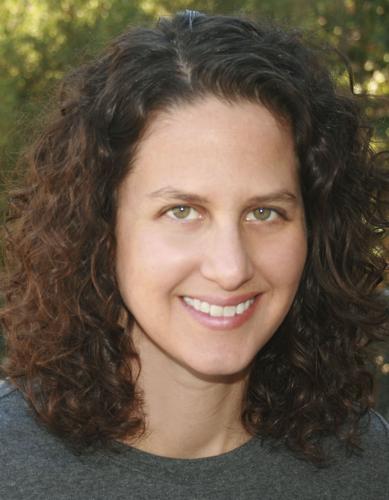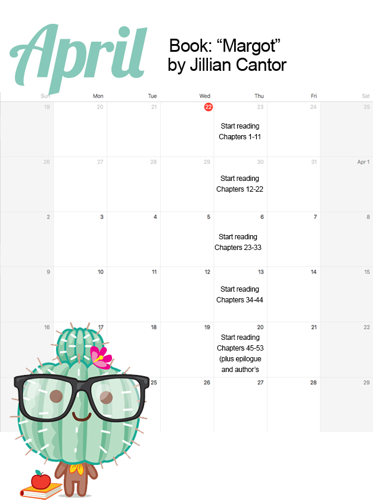Tucson author Jillian Cantor first read "Anne Frank: The Diary of a Young Girl" as a teenager.
The story resonated with her: She and Anne were about the same age, relished writing and had childhoods marked in some way by Jewish tradition.

But it was Margot Frank who captured Cantor's imagination almost 20 years after her first reading — the older sister mentioned and loved by Anne who wrote a diary of her own.
Her diary disappeared.
Both girls died of typhus in 1945 at the Bergen-Belsen death camp, but Margot's mostly-untold story piqued Cantor's interest.
She imagined a life for the older girl had she survived the Holocaust.
That is where her novel "Margot" begins.
Cantor is a Tucson author we discovered while reading our last book club pick "Veil of Roses" by local writer Laura Fitzgerald (Read more about that one here).
Fitzgerald suggested Cantor's book, we put it to a vote, and here we are.
In April (and the last bit of March), we'll be reading "Margot" by Jillian Cantor. Riverhead Books published the novel in 2013.
The story takes place in 1959 in Philadelphia, where Margot Frank has started anew as the quiet secretary Margie Franklin. In secrecy, she struggles to reconcile her past, a fresh identity and the new film everyone is talking about: "The Diary of Anne Frank."
How this will work:

Our reading schedule for "Margot" by Jillian Cantor.
If you want to be part of the #ThisIsTucson Book Club, head on over to Facebook and join us. Each Thursday, we'll post questions in that group related to a set number of chapters we'll read together over the course of a week.
We'll post our first round of questions next Thursday, March 30 for chapters 1 through 11. You can find the book online at Amazon.com or Barnesandnoble.com.
Cantor says you should be able to find the book at the book store of your choice or they can order it if they're out. Pro tip: Call in advance to see if "Margot" is in stock. It will keep you from returning empty-handed.
At some point during the month, we'll invite Cantor to join us for some Q&A time. Stay tuned throughout the month for other extra opportunities and stories.
We want this to be an open place of discussion, so feel free to share your own thoughts as you read — but definitely keep it kind.

Also, no promises for a spoiler-free zone. This is a book club, so we'll be talking about the book.
Writing about Margot:
In her author's note at the end of the book, Cantor, 38, shares that she wrote about Margot "to give back what was stolen from her, even if only in a fictional world: her voice, her life, her happy ending."
When Cantor began researching Margot, she learned that the information that existed about Anne Frank's elder sister was limited.
"She does have a small Wikipedia page," Cantor says. "Look her up and look Anne up and it's night and day. It's interesting that Margot also kept a diary in the annex, but it was never found."
For some, telling a what-if story about the survival of Margot Frank broaches sensitive territory, but the idea of treading near-sacred ground never occurred to Cantor. She wrote this book for herself.
"I had written this other book before Margot that didn't end up selling, so I was coming off of this long process and thinking, 'I'm going to write what I want to write for myself. No one will probably ever read it,'" she says. "If I had thought about it, I might have been nervous while writing, but I just didn't think about it."
In the author's note, she distinguishes between the fact and fiction interlaced throughout the book.
Cantor chose to bring Margot to America in light of the premiere of her sister's diary on the silver screen.
"I was really interested in the Hollywood version of the diary and how it romanticized it, so I knew I wanted to put her in America to see that movie, because I thought that would be interesting, to contrast the Hollywood version of her life and the real version of her life," Cantor says.
This wasn't meant to be a Jewish book about the Holocaust:
At least, that's not the kind of book Cantor set out to write.
"When I was first writing, I told my agent this is not a book about the Holocaust, and she laughed," Cantor says. "I wanted it to be about surviving and survivor's guilt and how you get past an experience like that."
She also didn't intend for this to be a "Jewish story."
"Once the book was published, people were saying, 'Oh, it's a Jewish author and a Jewish story,'" she says. "To me it just felt like a survival story."
Margot's Jewish faith and identity required Cantor to do some research. Although she is Jewish, she says she's "more of a cultural Jew" and "not super religious." The Margot of her book is more religious than she "ever was."
This book does make a case, though, for remembering what has happened so that it never occurs again.
And that is relevant even in Tucson, where in just the last few weeks our own Tucson Jewish Community Center has received two bomb threats and the Islamic Center of Tucson experienced a break-in that left copies of the Quran desecrated.
"Especially now it's important to remember what happens when we discriminate against a group of people and what can happen ..." Cantor says. "This book came out in 2013, and in a way it feels more relevant now than ever."
How she became a writer:
After a fourth grade assignment that required Cantor to write one short story every week, all year, she knew what she wanted to do when she grew up.
"It was my first experience with fiction, and I loved it," says Cantor who spent childhood in a Philadelphia suburb. "I told everyone I was going to be a writer."
In high school she veered toward a medical future— and was rerouted back to writing after dissecting a cat in anatomy class.
"I majored in English in college and worked for a newspaper one summer after my freshman year of college," she says. "I was an intern covering school board meetings all summer and I was so bored. I thought, 'This would be more fun if I could make stuff up.'"
So she took a fiction class that fall. She graduated with a bachelor of arts degree in English from Penn State University and her Master of Fine Arts degree from the University of Arizona. She has lived in Tucson since 2000.
For her MFA thesis, she wrote her first novel, and though it never got published, the experience pushed her to try again. That was "The September Sisters," her first published novel. On June 13, her seventh book "The Lost Letter" will be published.
Writing has gotten easier now that her two sons, ages 9 and 12, are in school.
"When I was writing 'Margot,' the youngest had just started preschool and everyday for three hours I would write," she says. "That was the first time I had uninterrupted writing time in years. I wrote it that first fall in preschool."
Some summers, she has hauled herself out of bed at 5 a.m. to cram in four hours of writing time before her boys wake up.
Historical fiction has become her sweet spot.
"Once I realized that there were people in history very similar to me with interesting stories to tell, I became interested in it," she says. "Learning about history is so relevant and so important."








